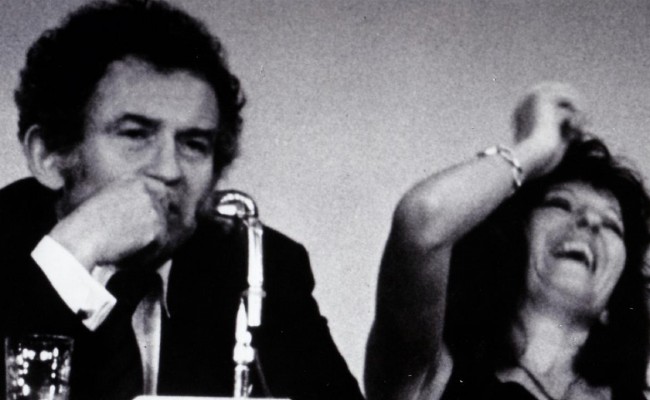I was so excited to see the Wooster Group’s The Town Hall Affair. I’d watched some clips from the 1979 documentary Town Bloody Hall, on which it’s based. Seen Germaine Greer, young, elegant, riding the wave of Female Eunuch acclaim, taking down the male artist, ‘the pinnacle of masculine privilege in our society’; revealing her reverence for this ideal as ‘an eccentric little girl who wanted to be a poet’, and the pathos of her betrayal when she came to realise ‘no woman yet has been adored for her poetry’.
I’d watched Jill Johnston, Village Voice critic and gay liberationist, mischievous, sunglassed, top-to-toe in denim, delivering a polemic on lesbianism with humour, whimsy and politesse – yes – her sentences looping on and out to poetry; seen her rudely interrupted by Norman Mailer with time limits as an excuse though it’s more likely he wanted Johnston gone because she was too threatening.
The 1971 debate about feminism that Chris Hegedus and DA Pennebaker’s Town Bloody Hall documents stars these three writers. A fourth feminist, Jacqueline Ceballos, head of the National Organisation for Women, the USA’s most powerful women’s organisation at the time, is pretty much ignored, which one might take as a comment on the built-in obsolescence of bureaucracy. The fifth, Dianne Trilling, old school literary critic, was more interesting in The Town Hall Affair than Town Bloody Hall, but more on that later.
I was enticed not just by the opportunity to see one of the world’s most prominent experimental theatre companies, about whom I’d heard so much, but also by their portrayal of Greer. This I shared with most of the Australian audience, differing from them perhaps in my view that Mailer, commonly and justly pilloried as the era’s most egregious chauvinist, actually got some things right. A book about writing titled The Spooky Art? Boom. Mailer’s rapid-fire New Yorkese in a way parallels Johnston’s freestyle and can be just as difficult to follow. More plainly, it recalled for me his essay The Last Draft of Deer Park, in which he recounts ‘bombed and sapped and charged and stoned with lush, with pot, with benny, saggy, coffee, and two packs a day, I was working live, and over alert … ’ Thus fuelled, Mailer pounded the typewriter long into the night, leaving us with literally millions of doorstops, two of which won the Pulitzer, making him one of America’s most successful post-war novelists. His riposte to feminism, The Prisoner of Sex, is what provoked the 1971 debate. It wasn’t an attractive gig: Gloria Steinem and Kate Millet had said ‘no’ to appearing.
And then, when I read that Elisabeth LeCompte’s springboard was Jill Johnston’s unfinished text, later extrapolated in Lesbian Nation (1973); when I’d seen the hilarious response of two women to Mailer’s dismissal of Johnston, jumping on stage to embrace her, the three of them falling to the floor, well, I was sold.
But you don’t have to know anything about Mailer nor even Greer and Johnston to appreciate The Town Hall Affair. What is transfixing about the Wooster Group is how they deliver text. Their method seems driven by veracity, each actor speaking lines from the debate with uncanny perfection, our eyes skipping to and from their mouths and those of their progenitors on a screen in their midst. It’s like a reverse lip-sync, applying a mirror to the unreality of theatre that keeps us in a constantly destabilised space, while drilling into a documentary about an actual event. The textual cut-up was echoed by a spatial one, with three screens differing in size, mobilised throughout, fracturing the brace made by the long table and rostrum upstage, virtually the only props. On the side, another space was occupied by technicians and actors playing bit parts.
Later we would learn that the actors use screens and mics as prompts for their lines, but beyond their accuracy was pitch, tone, presence. The female characters were each created with a different style and motivation. Maura Tierney made a barely recognisable Greer – low-key, plain, accent hovering somewhere over the Pacific; no plunging neckline and long shaggy hair, no sexy hauteur. Kate Valk, on the other hand, captured Johnston in all her endearing peculiarity, complete with denim and sunglasses; her searing declamations opened the show. Greg Mehrten’s Diana Trilling was also a faithful rendition. Mehrten apparently did a lot of research into Trilling, and you wouldn’t have known he had never played a woman before in his more than fifty years acting, such was his ease.
A screen showing the documentary was pulled down into the actors’ midst whenever they recited from the debate, then flung up to reveal a large back projection for extracts from Maidstone, Mailer’s 1970 film about a man called Kingsley (Mailer’s middle name) campaigning to be president. Despite its supposed political intent, Maidstone isn’t considered much more than one big ego-trip, the cast and crew as substance-fuelled as Mailer back in Deer Park days. A fight in the film between Mailer and actor Rip Torn, screened in The Town Hall Affair, was restaged by the two actors playing Mailer, Scott Shepherd and Ari Fliakos.
Herein lay the problem of The Town Hall Affair. The decision to use two actors to play Mailer, and the use of Maidstone, gave too much space to Mailer. Thus it shot itself in the foot. The power of the debate – as an illustration of gender politics in 1971 – is patent, a more than ample foundation on its own, with Mailer looking more of a fool as time goes on in his attempts to rein the women in, belittle their arguments and remain on top. Its fascination for us today lies also in the language and manners, striking in their formality, even in Johnston’s experimental prose and radical politics; Greer and Trilling are just as prolix, speaking in paragraphs we no longer hear in these contexts, worn down as we are by decades of festivals, talk fests and technology. Greer’s adoption of an English accent was common then for an Australian trying to make it internationally, and relieved the Wooster Group of a task that seems impossible for Americans: capturing the Australian vernacular. (Johnston pointed Greer’s birthplace out, as well as her own – England – as soon as she hit the mic, as though to strip back artifice.) All of this, the Wooster Groups presented with beautiful lucidity; the text, even when blurred, was never boring. But too much Mailer smothered it. The performances of Fliakos and Shepherd were weaker than the others’: craft notwithstanding, neither really came into his own yet they took up the space of two people, two men, two characters. Even though Johnston returned to the foreground to deliver the closing lines, she did not regain full power.
LeCompte said afterwards, in the Q and A, that their intention was to diffuse rather than double Mailer, ‘to get away from the One Man’. Why? It’s precisely the folly of this One Man – be him Mailer or Everyman – that is the point. He thinks he’s waving when, really, he’s drowning. Not so much a sheikh with his harem as a single human outwitted and outnumbered by greater intellects. Doubling his death throes did nothing to further the debate – which, like ‘marriage equality’, is a furphy anyway – nor to illustrate his puny position. LeCompte’s description of the restaged fight as ‘a fight between the two Mailers’ didn’t gel. Mailer displayed no conflict in his views on women, as far as I know (he died in 2007). He exists as a double only in the Wooster Group’s work, according to company members, because of ‘who was in the room’ when they created it. The promise to fully explore Johnston’s text wasn’t met – and yet the women prevailed. How can they not?
The Town Hall Affair felt unfinished. We stayed in our seats when lights went up wondering if it was interval. At 65 minutes long, it couldn’t hope to contain everything in Town Bloody Hall but I wondered at the exclusion of certain things. Interjections from the audience were deftly created from the lighting desk, and side stage. So where was Susan Sontag? From the floor, she pithily questioned Mailer’s use of the term ‘lady writers’ – a point still relevant today, even if muted by marketing terms such as ‘women’s fiction’. Where was Cynthia Ozick’s question that brought the house down and has since entered history: ‘Mr Mailer, you said, quote “A good novelist can do without everything but the remnant of his balls.” For years I’ve been wondering, when you dip your balls into ink, what colour is it?’ (Speaking of history, Ozick, then not well known, has triumphed as a novelist while Mailer fades.) And where was Johnston’s witty imagined parental dialogue about lesbianism? ‘I mean, you know how we’d feel if a black man was interested in our daughter … AARGHHH!’ The Town Hall Affair ended with Valk doing this scream, minus its precipitating remark.
LeCompte reminds me of Patti Smith. About the same age, bohemian left, tall, thin, white, strong. Running an experimental theatre company for over four decades is a remarkable achievement for anyone, let alone a woman born in the 1940s. (That the building on Wooster Street which houses the company was bought by precursor Richard Schechner in 1974 is not immaterial to this success, nor the celebrity of Willem Dafoe, a founding member.) Like Smith, LeCompte has done all of this without traditional feminine beauty: she is more masculine identified, and heterosexual. She wasn’t interested in the debate at the time and interestingly observed that when looked at from today, ‘the women were seducing the men, and the men the women, apart from Jill Johnston who moves through it all as a sort of sprite.’ I honestly couldn’t see that; Greer’s sexual charisma seems more innate that projected. To me, it looked like every single woman on stage and in the audience defied Mailer, with nary a frisson.
What is true is that feminism was being discussed in this hall in New York City in 1971 entirely in terms of relations between men and women, apart from Johnston’s input. Thankfully contemporary discourse has evolved to enable women to be considered on their own terms regardless of sexual orientation, and increasingly with diverse notions of gender. This, as Valk pointed out, is what makes Johnston the most modern of all the thinkers examined here. To this extent, The Town Hall Affair may have been even more interesting to the next generation down from me, but at $86–$96 a ticket, access was limited to the well-heeled, the tragic fate of most theatre in inner Sydney.
I owe the Wooster Group thanks for leading me to the 1971 debate. And they did include another great line from Greer on her theory that women’s and gay liberation are the same: ‘Sexual politics has something to do with the act of fucking being to the advantage of the one who is fucking and the disadvantage of the one who is fucked, be it woman, or man, or pig or goat … who is always characterised as female, therefore inferior.’ Take note, gay men. Take note anyone still invested in the masculine ideal; that is to say, just about all of us.
The Town Hall Affair, directed by Elisabeth LeCompte, was performed by the Wooster Group at the Sydney Opera House, 7–13 January, as part of the 2018 Sydney Festival.
Lead image: Norman Mailer and Germaine Greer; documentary still from Town Bloody Hall.




